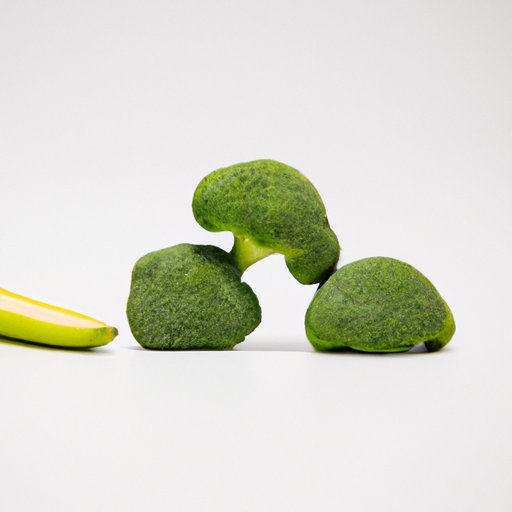Introduction
Iron is a vital nutrient that our bodies need to function properly. It is responsible for a variety of essential functions in our cells, including transporting oxygen, creating energy, and supporting a healthy immune system. Although iron is not a vitamin, it is often grouped together with other essential nutrients like vitamins and minerals. In this article, we will explore the importance of iron for your health and discuss why it is essential to incorporate iron-rich foods into your diet.
What is Iron and Why is it Important for Your Health?
Iron is a mineral that our bodies use to produce hemoglobin, a protein found in our red blood cells that carries oxygen from our lungs to the rest of our body. It is also involved in many other important functions, such as energy production, DNA synthesis, and immune system function. Without adequate iron intake, our bodies cannot properly transport oxygen or produce the energy that our cells need to function properly.
The Functions and Benefits of Iron in Your Body – an Overview
Iron plays several key roles in our bodies, including:
- Hemoglobin production and oxygen transportation: As mentioned earlier, iron is a critical component of hemoglobin, which carries oxygen from our lungs to the rest of our body.
- Energy production: Iron is involved in the electron transport chain, which is responsible for producing most of the ATP (the energy currency of our cells) in our bodies.
- Immune system support: Iron is involved in the production of white blood cells, which help our bodies defend against infections.
- Cognitive function and brain development: Iron plays an important role in brain metabolism, and deficiency has been linked to cognitive and developmental delays in children.
The Differences Between Vitamins and Minerals – Is Iron a Vitamin or Mineral?
While vitamins and minerals are both essential nutrients that our bodies need to function properly, they differ in several ways. Vitamins are organic compounds that our bodies cannot produce on their own, so we need to obtain them from our diet. Minerals, on the other hand, are inorganic compounds that our bodies also need, but in much smaller amounts than vitamins.
Iron is a mineral, not a vitamin. Although it is frequently grouped together with other essential nutrients, it is not classified as a vitamin because it is not an organic substance. However, like vitamins, we need to get iron from our diet to maintain optimal health.
The Risks and Complications of Iron Deficiency and How to Prevent it
Iron deficiency is a common nutritional problem that affects many people, particularly women, young children, and vegetarians. Without adequate iron intake, our bodies cannot produce enough hemoglobin or red blood cells, which can lead to a variety of health complications, including anemia, fatigue, and reduced immune function.
Common causes of iron deficiency include poor diet, blood loss, and certain medical conditions that affect iron absorption or metabolism. Symptoms of iron deficiency can vary widely depending on the severity of the deficiency but can include fatigue, shortness of breath, headaches, and pale skin.
To prevent iron deficiency, it is important to consume adequate amounts of iron-rich foods, such as red meat, poultry, fish, legumes, tofu, dark leafy greens, and fortified cereals. You can also enhance iron absorption by consuming vitamin C-rich foods, avoiding calcium-rich foods during meals, and cooking in cast iron pans.
How to Incorporate Iron-Rich Foods into Your Diet for Optimal Health
If you are looking to increase your iron intake, there are plenty of foods you can add to your diet that are both delicious and nutritious. Some excellent sources of iron include:
- Red meat, such as beef and lamb
- Poultry, such as chicken and turkey
- Fish, such as salmon and tuna
- Legumes, such as lentils and beans
- Tofu
- Dark leafy greens, such as spinach and kale
- Fortified cereals and grains
It is also important to note that certain foods can help enhance iron absorption in your body. For example, consuming vitamin C-rich foods like citrus fruits, bell peppers, and broccoli can help your body absorb more iron from plant-based sources. On the other hand, consuming calcium-rich foods like dairy products or taking calcium supplements during meals can inhibit iron absorption.
Here is a sample meal plan that incorporates several excellent sources of iron:
- Breakfast: Spinach omelet with whole wheat toast and a glass of orange juice
- Lunch: Lentil soup with mixed greens salad topped with grilled chicken, cherry tomatoes, and bell peppers
- Dinner: Grilled salmon with quinoa and steamed broccoli
Understanding Iron Supplements: Do You Need Them and How to Choose the Right One?
If you are unable to get enough iron from your diet, you may need to consider taking an iron supplement. However, it is important to speak with your doctor before starting any supplements, as too much iron can be harmful, particularly for people who already have high iron levels.
There are two main types of iron supplements: ferrous and ferric. Ferrous iron supplements are the most commonly recommended because they are better absorbed by the body. They are also often less expensive than ferric supplements. When choosing an iron supplement, it is important to consider factors such as dosage, form (pill, liquid, or chewable), and cost.
Conclusion
Iron is a vital nutrient that our bodies need to function properly. It plays a critical role in several key functions, including oxygen transportation, energy production, immune system support, and cognitive function. While iron is not classified as a vitamin, it is an essential mineral that we need to obtain from our diet to maintain optimal health. By incorporating iron-rich foods into our diet and, if necessary, taking iron supplements under the guidance of a healthcare provider, we can ensure that our bodies are getting the iron they need to function at their best.
